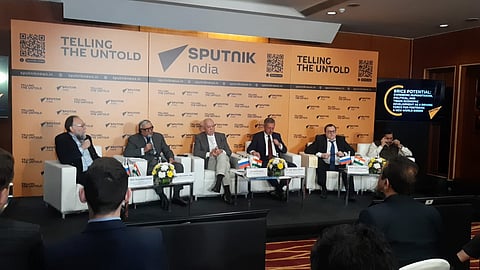

NEW DELHI: Amid the ongoing Russia-Ukraine conflict, Russian envoy to India Denis Alipov on Wednesday said though there was not much ground Moscow is prepared to sit and talk with Kyiv, provided there is an "acceptable basis" for it.
Making his remarks during a round table discussion, he was asked if Russia would be willing to sit across the table and talk with Ukraine to seek a resolution to this conflict. To this, the envoy said, "Frankly... don't see much ground for negotiations at the moment."
Alipov said, "What we are prepared for is to sit and talk, provided there is a basis for negotiations." The basis should include the "ground realities" in the first place, interests of Russia from the security point of view and protection of Russians within Ukraine and Ukrainian citizens of Russian origin, he said in response to a query during an interaction session here on BRICS and its potential.
Adding that the negotiations be on an acceptable basis, the Russian Ambassador remarked, whether it will be Zelenskky or some other person, this is a question.
Alipov took part in the round-table discussion on "BRICS Potential: Expanding Humanitarian, Political, and Trade-Economic Development as a Driving Force for Fostering a New World Order". The session was hosted by the Russian state-owned news agency Sputnik.
The Russian envoy gave the opening remarks, hailing BRICS and described the grouping as a dedicated platform of emerging powers, the developing world and the Global South - a "reflection of new realities".
During the interaction, the envoy also said Ukrainian President Volodymyr Zelenskky at present is "very much an unelected president" after the end of his five-year term.
Zelenskyy was elected as the President of Ukraine on April 21, 2019. The President of Ukraine is elected by the citizens of the country based on universal, equal and direct suffrage by means of secret ballot for five years, according to the official website of the President of Ukraine, which mentions Zelenskyy as the current president.
"There are no provisions in the Ukrainian Constitution for a president to proceed without an election - war times or no war times. So, from this point of view, he is very much an unelected president," Alipov claimed.
The Russia-Ukraine conflict, which began in February 2022, entered its 1,000th day on Tuesday. Zelenskyy has championed the fight from the Ukranian side.
During the interactions Alipov, responding to a query on whether a new world order could be achieved in the near future given that two major conflicts are underway, said, "I believe BRICS is very much capable of becoming a major platform for conflict resolution."
"What we believe and what the process and discussions within BRICS have increasingly shown is that BRICS will be capable of at least being a discussion platform for conflict resolution. Whether it can resolve current or future conflicts remains to be seen," Alipov said.
Among the speakers was former Indian foreign secretary of India Kanwal Sibal who talked about the "narrative" associated with the Ukraine conflict, saying it was drawn largely from the Western press.
Alipov said it was made out that Russia is a country that "jeopardised international stability by attacking Ukraine".
"Forgetting that before that, for decades, Russia wanted... very openly advocated for dialogues. But the other side didn't listen. This is precisely the problem that led to the aggravation of hostilities," the Russian envoy said.
The round-table here took place nearly a month after the BRICS Summit in Russia's Kazan that was held under the Russian chairmanship with the motto 'Strengthening Multilateralism for Equitable Global Development and Security'.
The theme echoed a demand for real equality in international relations and the reform of global governance. A reflection of the aspirations of leading emerging economies to have a larger role in decision-making, he said.
"Within BRICS, we respect sovereign equality, diversity and mutual interests. BRICS stands out as a platform free from the domination of one particular power, unilateral sanctions, and double standards. And, we reject interference in domestic affairs whatever is the pretext," Alipov said in his opening remarks.
Russia believes the Summit in Kazan has signalled that a "new constructive international agenda" is taking shape.